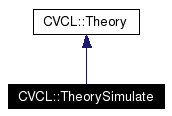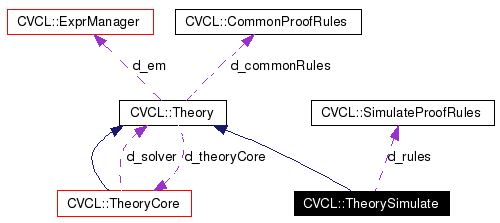
#include <theory_simulate.h>
Inheritance diagram for CVCL::TheorySimulate:


Author: Sergey Berezin
Created: Tue Oct 7 10:13:15 2003
This theory owns the SIMULATE operator. It's job is to replace the above expressions by their definitions using rewrite rules.
Definition at line 54 of file theory_simulate.h.
|
|
Constructor.
Definition at line 43 of file theory_simulate.cpp. References createProofRules(), d_rules, CVCL::Theory::registerTheory(), and CVCL::SIMULATE. |
|
|
Destructor.
Definition at line 55 of file theory_simulate.cpp. References d_rules. |
|
|
Create proof rules for this theory.
Definition at line 46 of file simulate_theorem_producer.cpp. References CVCL::Theory::theoryCore(). Referenced by TheorySimulate(). |
|
|
Assert a new fact to the decision procedure. Each fact that makes it into the core framework is assigned to exactly one theory: the theory associated with that fact. assertFact is called to inform the theory that a new fact has been assigned to the theory. Implements CVCL::Theory. Definition at line 66 of file theory_simulate.h. |
|
|
Check for satisfiability in the theory.
Implements CVCL::Theory. Definition at line 67 of file theory_simulate.h. |
|
|
Theory-specific rewrite rules. By default, rewrite just returns a reflexive theorem stating that the input expression is equivalent to itself. However, rewrite is allowed to return any theorem which describes how the input expression is equivalent to some new expression. rewrite should be used to perform simplifications, normalization, and any other preprocessing on theory-specific expressions that needs to be done. Reimplemented from CVCL::Theory. Definition at line 61 of file theory_simulate.cpp. References d_rules, CVCL::SimulateProofRules::expandSimulate(), CVCL::Expr::getKind(), CVCL::Theory::reflexivityRule(), and CVCL::SIMULATE. |
|
|
Compute and store the type of e.
Reimplemented from CVCL::Theory. Definition at line 73 of file theory_simulate.cpp. References CVCL::Type::arity(), CVCL::Expr::arity(), CVCL::Type::funType(), CVCL::Theory::getBaseType(), CVCL::Expr::getKind(), CVCL::int2string(), CVCL::Type::isFunction(), CVCL::isRational(), CVCL::isReal(), CVCL::Expr::setType(), CVCL::SIMULATE, CVCL::Type::toString(), and CVCL::Expr::toString(). |
|
|
Compute and cache the TCC of e.
The default implementation is to compute TCCs recursively for all children, and return their conjunction. Reimplemented from CVCL::Theory. Definition at line 172 of file theory_simulate.cpp. References CVCL::andExpr(), CVCL::Expr::arity(), CVCL::Type::arity(), CVCL::ExprManager::falseExpr(), CVCL::Theory::getEM(), CVCL::Expr::getKind(), CVCL::Expr::getRational(), CVCL::Theorem::getRHS(), CVCL::Theory::getTypePred(), CVCL::Type::isFunction(), CVCL::Theory::rewriteAnd(), CVCL::SIMULATE, CVCL::Expr::toString(), and CVCL::ExprManager::trueExpr(). |
|
|
|
|
||||||||||||
|
Theory-specific pretty-printing. By default, print the top node in AST, and resume pretty-printing the children. The same call e.print(os) can be used in DP-specific printers to use AST printing for the given node. In fact, it is strongly recommended to add e.print(os) as the default for all the cases/kinds that are not handled by the particular pretty-printer. Reimplemented from CVCL::Theory. Definition at line 223 of file theory_simulate.cpp. References CVCL::Expr::arity(), CVCL::Theory::d_theoryUsed, CVCL::Expr::getKind(), CVCL::ExprStream::lang(), CVCL::LISP_LANG, CVCL::pop(), CVCL::PRESENTATION_LANG, CVCL::Expr::printAST(), CVCL::push(), CVCL::SIMULATE, CVCL::SMTLIB_LANG, and CVCL::space(). |
|
|
Our local proof rules.
Definition at line 57 of file theory_simulate.h. Referenced by rewrite(), TheorySimulate(), and ~TheorySimulate(). |
 1.4.4
1.4.4